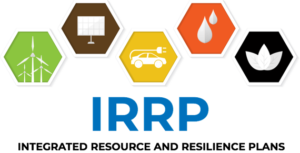
As work progresses with development of Integrated Resource and Resilience Plans (IRRPs), a few critical stages are now complete in most member states the CCREEE is partnering with in this initiative – specifically Belize, the Cooperative Republic of Guyana and the Republic of Trinidad and Tobago. The data collection phase is near completion in two of the three IRRP member states.
Data is an integral part of the IRRPs; the plans are data-driven and data-intensive. It requires comprehensive technical data on electrical demand and demand-side matters, the existing grid infrastructure, electrical supply assets and their performance. In addition to the technical energy system dataset, information on policy, social and economic statistics and hazard and vulnerability data are also collected. One inherent challenge to the data collection process is that such wide-ranging data is held across many different entities. This requires effective engagement and coordination.
The goal of the IRRP process is to devise a plan to meet our future electricity needs and so, an estimation of those needs is thus a necessary first step. As such, a demand forecast is perhaps the first critical analytical task in the IRRP process. This formative task has now been completed in one member state and is progressing in another. . We can make reasonable estimates of future demand for electricity using various techniques. Many techniques rely not only on the level of demand today, but also the determination of relevant external variables that can be used to determine how demand may change in the future. An example is economic growth, as demand is expected to grow with a society’s prosperity and increasing levels of consumption and productive activity. Another example is climate change: as the temperature rises, the need for air-conditioning in buildings rises, increasing the demand for electricity.
The development of future scenarios and a scoring methodology for evaluating them are two other key activities in the IRRP process. The first envisions potential or target future scenarios to examine the implications of each of these paths. The second is a framework for evaluating the same future scenarios and is created from the countries’ development visions, policies, goals and targets. Best practice also calls for wide stakeholder input, both in envisioning the future system and determining what is important when evaluating our options. Each of the various stakeholder groups has started these interesting and fruitful discussions with some nearing completion.
The CCREEE views holistic energy sector planning and resilience-building as key for the region’s development; and as a result, is institutionalizing the IRRP process into its suite of programmes. The IRRP process outputs a pipeline of necessary investments, the realisation of which would be supported by CCREEE’s Project Preparation Facility (PPF). The human capacity development that must undergird all resilience building will be supported by CCREEE’s CARICOM Energy Knowledge Hub (CEKH). CCREEE’s programmes all connect with the ultimate goal of transforming the Caribbean’s energy sector, in order to transform Caribbean lives.